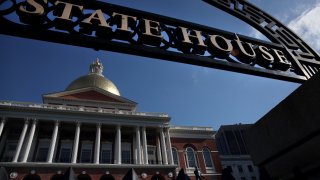
Massachusetts tax revenues collapsed well below expectations in April, shifting the year-to-date performance from about $870 million in the black to, by one measure, $703 million in the red.
The state Department of Revenue announced Wednesday it brought in $4.782 billion in April 2023, typically the strongest month of the year for tax collections. That's $2.163 billion less than in April 2022, a drop of 31.2%, and $1.435 billion or 23.1% below the most recent monthly benchmark projection.
"That's a pretty substantial shortfall, and it really does change the tax trajectory for the fiscal year," said Evan Horowitz, executive director of the Center for State Policy Analysis at Tufts University. "I don't think it imperils state spending or the solvency of the current fiscal year, but I do think it means there's not going to be a lot of money to play around with at the end of the year. It really does tighten the rings of this fiscal year."
The development means state officials, who have been engaged in a prolonged era of spending growth, now face budget management decisions that some in elected office have never faced and which date back to early in Gov. Charlie Baker's first term.
Get Boston local news, weather forecasts, lifestyle and entertainment stories to your inbox. Sign up for NBC Boston’s newsletters.
Through 10 months of fiscal year 2023, Massachusetts has now collected $703 million less than executive and legislative budget chiefs originally expected to haul in by this point when they first crafted benchmarks for the cycle, a reversal from the roughly $870 million above original benchmarks the state reported through March.
"The decrease in April revenues largely represents a previously understood exposure to the fiscal year 2023 budget from capital gains and the timing of taxpayers' use of pass-through-entity credits that we are reviewing closely and will continue to monitor over the final two months of the fiscal year," Administration and Finance Secretary Matthew Gorzkowicz said in a statement. "We remain confident in our ability to work with our partners in the Legislature to adjust and utilize available resources to manage the budget and close the fiscal year in balance."
Gorzkowicz and the Healey administration did not announce any immediate budget decisions. The secretary signaled he does not currently believe they will need to execute budget cuts, known as 9C cuts, to manage the shortfall. Without offering specifics, the administration also speculated about using "one-time funding sources generated by prior year surpluses."
The sudden, precipitous drop after more than two years of rapid revenue growth alters the atmosphere on Beacon Hill, where lawmakers and Gov. Maura Healey have been pursuing aggressive increases in state spending and sizable new tax relief.
With only two months remaining in the fiscal year, it could be difficult to trim state spending in a meaningful way.
Massachusetts had more than $7 billion stashed away in its "rainy day" long-term savings fund as of March 14, according to figures House Democrats presented last week, and state government could tap into that money to paper over gaps this year.
The House last week approved a $56.2 billion state budget for fiscal year 2024. Their plan is built on the assumption that Massachusetts will collect $41.4 billion in tax revenue next year, which legislative and Healey administration budget chiefs agreed to in January, as well as the initial impacts from a tax relief bill whose eventual size could grow to $1.1 billion annually.
Senate Democrats are expected to roll out and then approve their own budget bill this month, and they have avoided committing to a specific timeline for a response to the House's tax relief proposal. Healey administration officials said the governor's tax relief plan "remains sound, reasonable and affordable fiscal policy" and that they don't currently plan to revisit the revenue estimates being used to build the fiscal 2024 state budget.
Alison Kuznitz contributed to this report.



